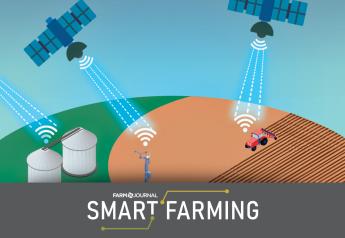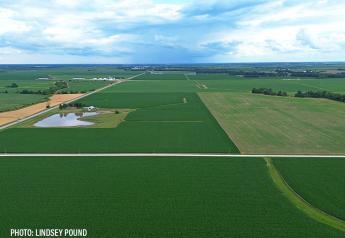Farm Legend in the Making, Ken Ferrie Delivers Bare-Bones Crop Truth
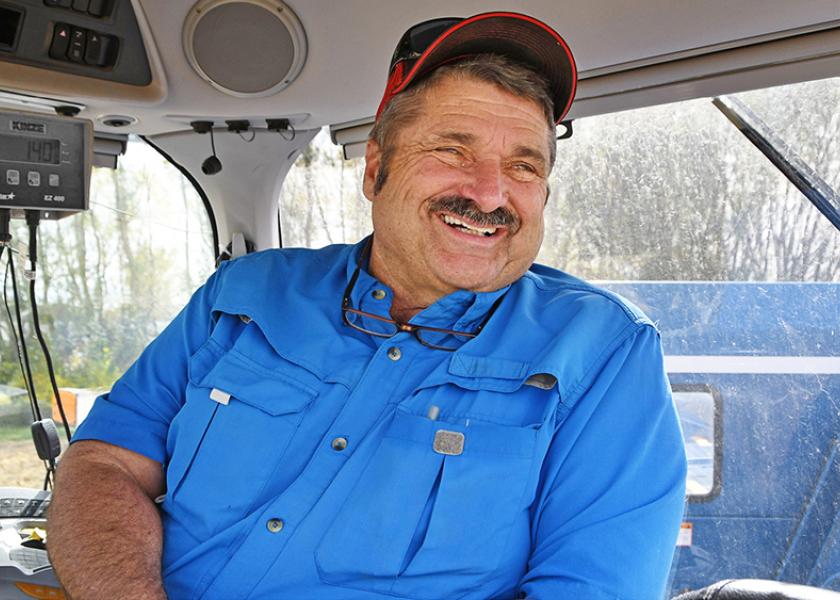
Gripping a wooden club, young Ken Ferrie, 18, slipped through a trapdoor and descended into the bowels of a northeast Iowa grain elevator leg pit containing a fetid soup of 1’-deep rotting soybeans. Three rungs down a ladder, Ferrie’s gag reflex kicked in as his nose and lungs rebelled against an odor from funk hell—a reek rank enough to make manure smell like fresh-cut flowers.
Reaching the bottom of the concrete-lined pit atop putrid grain, with blue jeans stuffed into the relative protection of five-buckle boots, Ferrie and a co-worker shoveled foul beans into a roped, 5-gallon bucket, stopping only to club brown rats that skittered across their boots, before calling to another worker above the trapdoor to haul up the overflowing bucket. Wash, rinse, repeat until the pit was clean.
“I thought I knew all about life before I went in that leg pit,” Ferrie recalls. “Reality hit me: The guy shoveling beside me had been there 10 years and the bucket guy above me had been there 15 years. I knew I was these guys in 20 years unless I made a change.”
Thus the unlikely spark that lit Ferrie’s fire and initially steered him toward life as a national agriculture resource, providing crop and tech expertise via consultation, seminars, articles, podcasts, DVDs, Corn College events, and far more. Walking a wire between infectious optimism and painful plain speak, Ferrie is testament to a reputation built on consistency. A simple kind of man: Tell the cold, hard truth every time.
“Across my whole career, I’ve tried to speak on the good, bad, and ugly,” Ferrie, 61, says. “Even though it can get brutal, it’s my job to shoot straight, because in the end, a farmer wants one thing from me—the truth.”
The Mirage
There is no flash in Ferrie. Three miles northeast of Heyworth, in central Illinois, at 5:30 a.m. each day, Ferrie’s feet hit floor—sans alarm. He drains a cup of decaf coffee while reading the Good Book and praying the Rosary during a 45-minute devotion. Following cattle chores, Ferrie climbs into red F-150 and heads for the corn and soybeans of Illinois.
He is a teacher at heart: Throw Ferrie the tiniest bone of a question, and expect a meal. “If I wasn’t in farming, I’d be teaching history or agriculture, or a combination,” he says. “Then again, I couldn’t stand not being around farmers.”
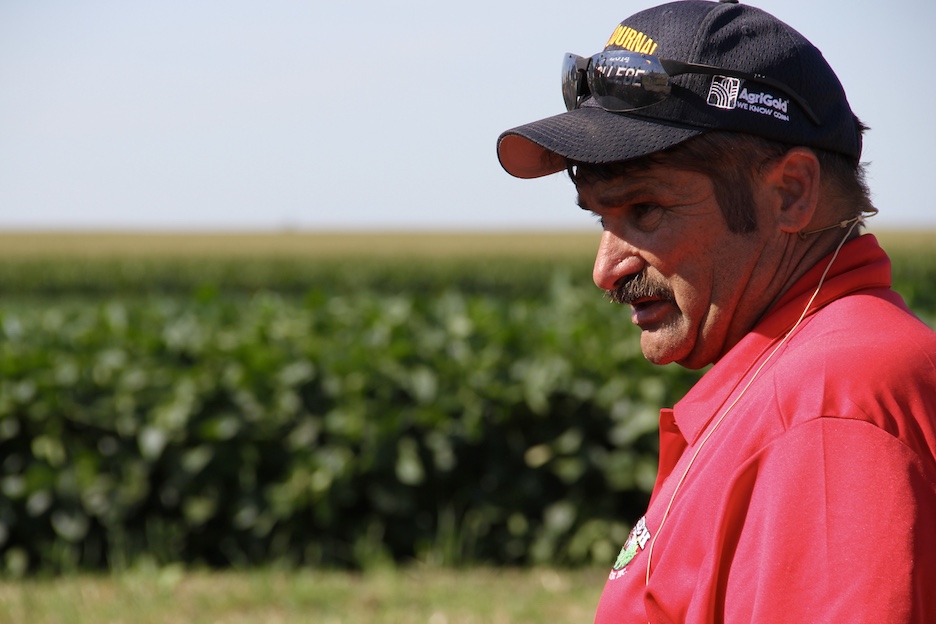
Swarthy in feature, Ferrie claims German and Irish heritage, but apparently lost an Italian or a Frenchman in the woodpile. He is consistently adorned in blue or red short-sleeved shirts, jeans, steel-toed boots, and an ever-present ball cap—essential apparel he would wear in church if social sensibilities could withstand the imposition. Complemented by a hatchet on the belt, a 6” toad sticker, and a folding knife in a side pocket, Ferrie is a force in the field.
In 1991, in tandem with his wife, Jeanenne, Ferrie founded Crop-Tech Consulting. The outfit’s stellar footprint reaches farmers across the U.S. with soil testing, recommendations, and services, along with 150-plus tale-of-the-tape test plots per year gauging equipment, field practices, and ag tech. However, its founding date of 1991 is a mirage. In truth, Crop-Tech’s foundation and credibility were built on the benchmarks of Ferrie’s life—lesson by lesson.
Taking the Cure
Born in a proverbially large Catholic family of 12 kids, Ferrie’s childhood was spent on a 160-acre farm in northeast Iowa, just outside Cresco, the boyhood stomping grounds of Norman Borlaug, an agricultural titan who served as a seminal influence in Ferrie’s life.
“My parents had a small, concentrated livestock and dairy farm, with some poultry and farrow-to-finish hogs,” he describes. “Picking rocks, scooping manure, feeding pigs, baling hay, and milking cows was all normal life. Twelve kids are a helluva labor pool.”
Upon high school graduation, Ferrie worked at the local co-op, intent on a labor career at the elevator. The leg pit rats cured him of such aspirations. He jumped tracks and went to junior college, hoping to return to the elevator as a manager.
However, life never moves in straight lines.
Furthest and Least
Debt, even to 18-year-old Ferrie, was garlic to a vampire. He took college courses in the morning and drove a fertilizer truck until dark, then walked across the road to an elevator to run a corn dryer all night.
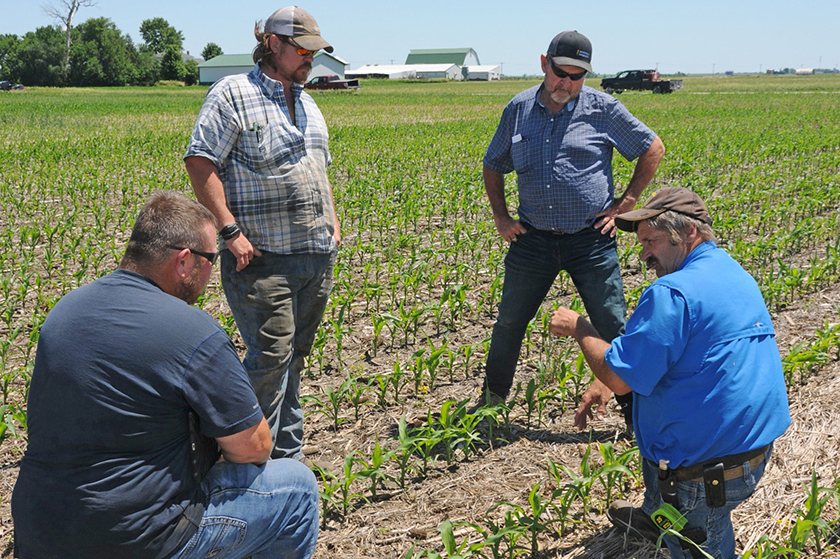
Two years later, agriculture business degree in hand, Ferrie’s plans collapsed under the weight of the 1980s’ anemic farm economy. (Ferrie later earned four-years degrees in ag business and ag science from Illinois State University). The co-op wasn’t hiring and the managerial program was stalled.
“I’m a pinball in the machine and the Good Lord is the player,” Ferrie describes. “It was one of those times when you fly all over, hit a hard spot and ricochet. The Lord is directing you, but you just don’t see it in moment.”
Ricochet, indeed. The boy from Cresco hit the road, chewing the fat on seven interviews and seven job offers across the Midwest. Against the grain, Ferrie grabbed the offer that was furthest away and paid the least—in Clinton, 8 miles south of Heyworth—intending to return home in three years.
Best laid plans.
Shaking the Dust
Ferrie took on the role as production specialist at a wholesale company with retail facilities. “It was a unique job because I was a salesman, but I was also an applicator, crop scout, and soil tester for the same farmers. I was mentored by Everett Dennis in Manhattan, Kan., and he was hugely influential in my life. I spent a lot of class time in Kansas with him, and then learned again with him in the field here. It was complete immersion in production agriculture.”
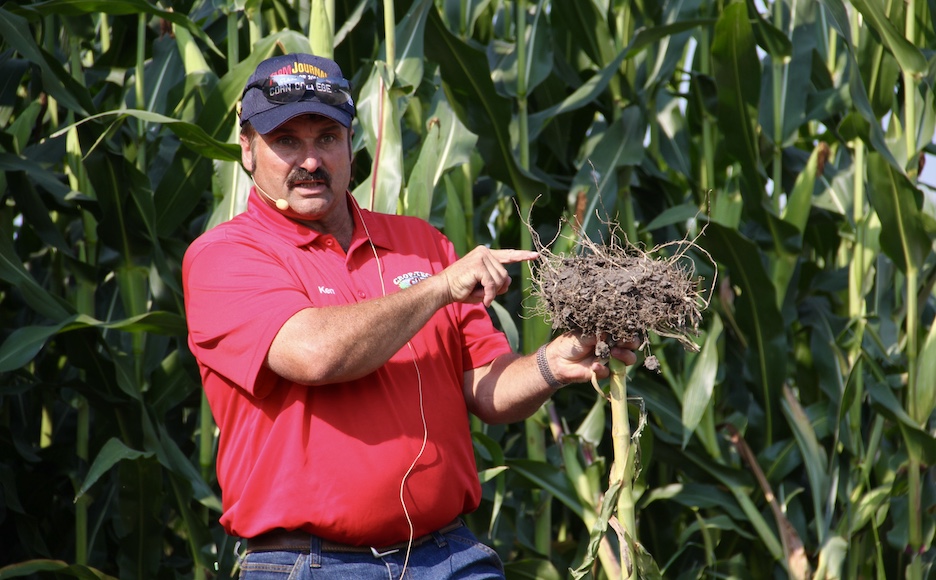
In a nutshell, Ferrie served as an information broker, observing what worked on one farm versus another. He rose quickly through the ranks, weathering buyouts and consistently gaining new farmer customers. During one major closeout, Ferrie soaked up an invaluable lesson when 90% of his customers followed him to a new facility. The farmer customers were not buying from Ferrie because of price. “It was a lightbulb moment,” he recalls. “They were buying from me because of service and consultation on fertilizer, herbicide, insects, and more.”
Ferrie’s climb continued. He jumped from plant manager/salesman to lead agronomist, tasked with developing a structured consulting program within the company. It was all clockwork—until Ferrie slammed into the brick wall of new management in 1991 and couldn’t shake his principles.
Soil testing, emphasized by Ferrie, was gaining in use with farmer clientele, and the results often resulted in a drop in fertilizer applications. Company management frowned on the mathematics: less fertilizer, less sales. “They said, ‘We can’t have widespread diminishment of fertilizer use,’ and they tried to rein me in,” Ferrie recalls. “There was no way I was going to be part of that. I was through.”
Reputation intact, he shook the dust off his shoes. At 30 years young, living in a 600-square foot rental house akin to a hired man’s shack with Jeanenne and their two small kids, Ferrie was within arm’s length of his own business, big on ambition but skinny on resources. “I wanted to start my own consulting company,” he says, “but I didn’t have a pot to piss in, or a window to throw it out.”
Bare Bones
Backed by a steady job in Bloomington, Jeanenne responded to her husband’s conundrum with a fastball down the middle: “You can do this, so go for it,” she said. “I’ll cover the bills and you fire up the engine.” (Jeanenne was vital at all stages of business development; she later dropped her city job and took over as Crop-Tech comptroller.)
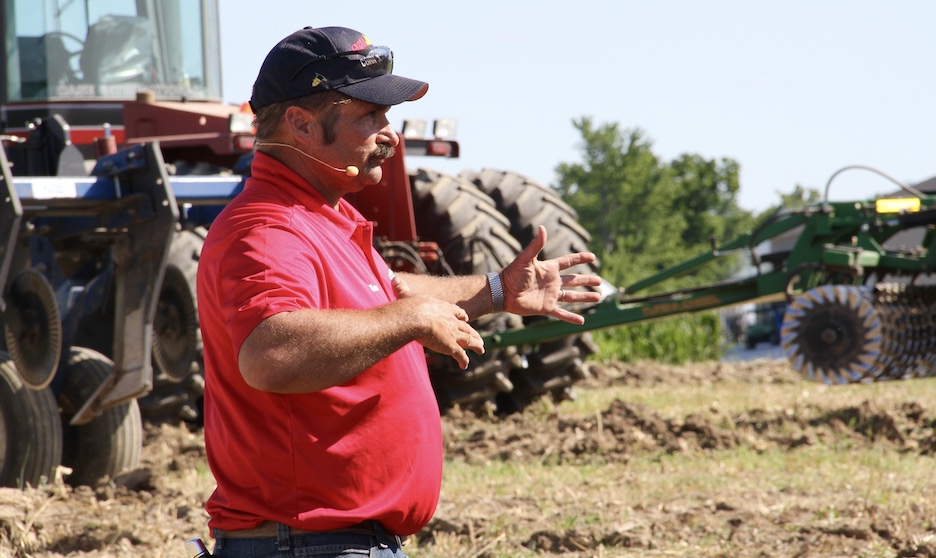
Running lean, Ferrie bought a 12’x12’ wooden shed and dropped it in the back yard, strapped with a portable furnace and air conditioner. Crop-Tech Consulting was born. “That was our start,” he says, in between fits of laughter. “The farmers who started to come visit must have thought I was nuts. Yeah, OK, maybe I was.”
However, coming from the ag retail sphere, the prescient Ferrie knew that appearances and window dressing held little sway. Pared down, he offered farmers himself and a straight-laced reputation.
Ferrie placed dual pillars beneath the foundation of Crop-Tech. The first: sell nothing. “We don’t push a product or sell you anything. There are no commissions. We’ll test and research and show you the results, and the rest is up to you. It took a while for farmers to understand that and believe, but once they understood the system, it became part of our reputation.”
The second: bare bones. “We tell farmers the truth, even if they don’t wanna hear it. That is different from retail. If you tell a farmer in retail what he doesn’t like, he’ll go out the door to the competition. However, in this business, whether that’s people who hire us to consult on their farm, or participate in a seminar at their operation, or pay for Corn College, they’re looking for the truth. They may not agree, but we shoot straight, otherwise we jeopardize our reputation and the relationship will go down the drain.”
Many a day, Ferrie has stood in the corn rows, nose to nose with a farmer, pointing out a shortcoming or deficiency. “There are farmers looking for a consultant to line up with their ideas, and if you challenge those ideas, they’ll leave. Truth is, those type of farmers will leave anyhow at some point soon.”
“We hold meetings all over country and tell the plain facts about all kinds of products, equipment, and management,” he continues. “For example, I’ll hammer and praise cover crops and strip tilling, and at the end, a farmer will come ask, ‘So which are you for?’ That depends on how it benefits the farm.”
“Eventually, a farmer customer realizes we’re not salesmen,” Ferrie says. “Reputation never strays from what we do, and that’s why consistency is crucial.”
Shorty Olson
In spring 1992, the second year of Ferrie’s fledgling Crop-Tech, Lawrence “Shorty” Olson knocked on the shed door. By mid-summer, roughly at July tassel, Ferrie stood in Olson’s Dewitt County corn, staring at odd gaps and the glaring absence of a picket fence.
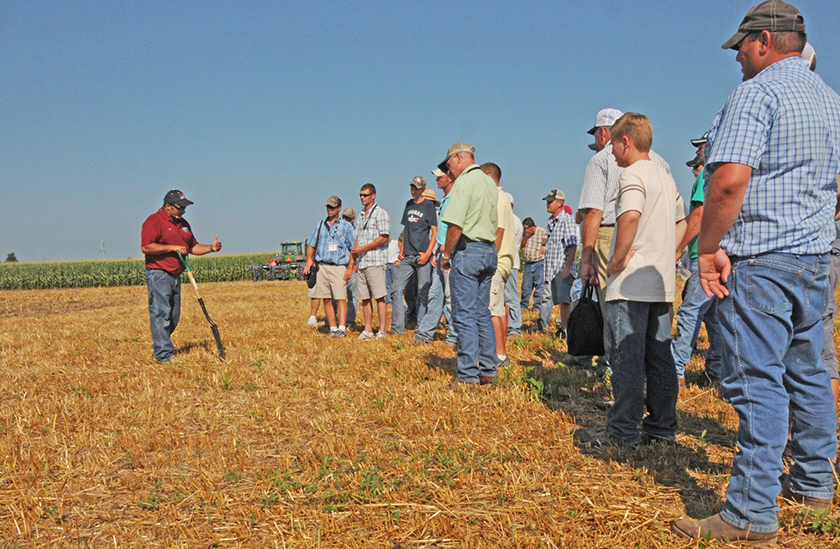
Olson had just bought a brand-new planter. “I’ll never forget his words,” says Olson, 85. “Ken looked at me and said, ‘Shorty, you need a new planter.’”
Frustrated, Olson declined, despite the planter placing staggered, inconsistent spacing between seeds and sometimes dropping multiple seeds together. Ferrie contacted the dealer and obtained a specialized drum to improve function—an equipment band-aid.
The next season, Olson again ran the planter and saw improved—but subpar—results. Once again, Ferrie spoke up: “Shorty, you need a new planter.”
Olson bit into reality and traded for a Kinze planter. Boooooom. “I was flabbergasted,” Olson exclaims. “My yields jumped 20 bushels per acre the very first year I used it. Equidistant spacing made all the difference. Ken made money for me and I stuck with him until the day I retired. His goal is to always improve yields for his clients.”
Ferrie is a study in simplicity, Olson observes. “You won’t find anyone nicer than Ken, but he’s still able to tell it like it is. No punches pulled and he will never, never tell you what to buy. He has clients across this country and the reason they seek him out starts with his reputation as a guy who lets the facts do the talking.”
“What drives Ken every day? He loves to help farmers and all the rest is second place,” Olson insists. “I don’t have any deep answers because he just loves to help farmers. He’s a simple kind of man.”
Foot in the Grave
Busting out of the 12’x12’ prefab, Ferrie and Jeanenne moved Crop-Tech inside Heyworth and continued squirreling away money for a future facility purchase: 15 years of saving. “We didn’t want to borrow,” Ferrie says. “I’ve seen so much money borrowed in the consulting world for trucks and equipment and then things collapsed.”
In 2005, Ferrie bought land 3 miles south of Heyworth, and began building. In 2007, construction complete, Crop-Tech debuted its present iteration, followed by the kickoff of Corn College in 2008. “People walked in the door and said, ‘You’re exploding in growth.’ No, the truth was the exact opposite. We were a slow burn.”
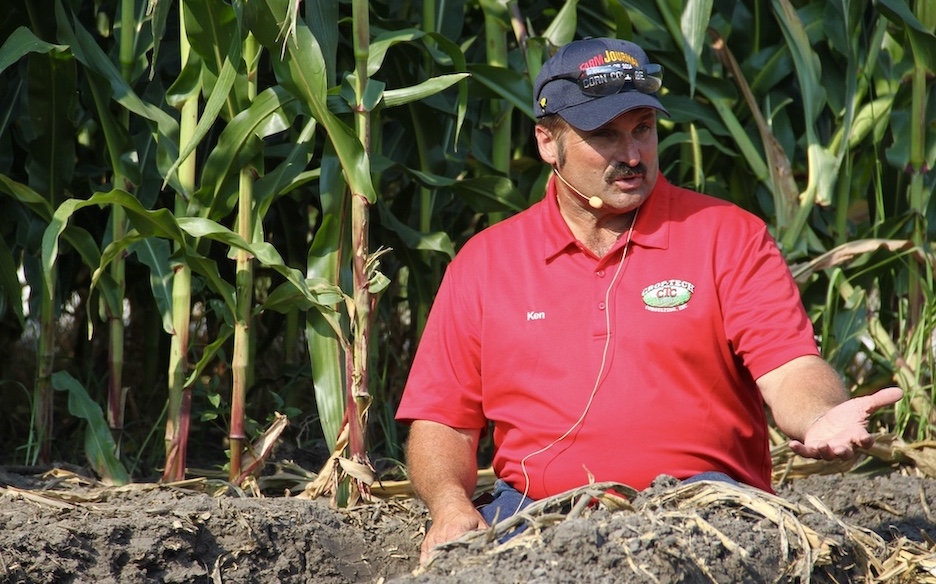
At present, one segment of Crop-Tech centers on research and plot trials on thousands of acres, in conjunction with Farm Journal. Ag companies submit products for truthing, and Ferrie’s crew gathers data to call balls and strikes. “The people sending us equipment, seed, or chemicals realize we have no agenda,” Ferrie says. “We’re just trying to find the bottom lines. The standard trial occurs when one of our farmers donates the land and takes the yield hit or bump, and ag companies provide the test items, whether a fungicide or strip till bar, and nobody is paid. No money changes hands. Everybody is in it for the data or exposure.”
A far more substantial portion of Crop-Tech focuses on consultation, soil testing, recommendations, and management of yield files, with customers concentrated within a one-hour to two-hour radius of Heyworth, but extending to farmers across the Midwest and beyond—even to the Eastern Shore of Maryland.
After 40 years in the corn and soybeans of countless farms, what is the common denominator Ferrie consistently sees on successful operations? What does he consider as the first key to gain? “It’s a really solid handle on agronomic fundamentals,” he notes. “You can be an excellent marketer and you can have the newest technology, but underneath that, you must have a rock-solid foundation in the field. Two different kinds of farmers hire us: One, someone who does a good job and is eager to learn and wants to do even better. Two, someone with one foot in the financial grave and terrible yields, and only half of those can be saved. That’s a lesson for us all: Don’t wait too late.”
The Yield of Integrity
Faith, family, and farmers—and little else of priority for Ferrie. Three (Isaac, Katie, and Zachary) of Ferrie and Jeanenne’s four children play major roles within Crop-Tech: “Just like the farmers I work with, we’re a family business,” Ferrie describes. “That’s a tremendous driver for me and could not be more fulfilling. I spend a lot of off-farm time in service to my church and family, and my interests don’t go much further, besides hunting and fishing.”
There is another side to the coin—a tarnish Ferrie does not attempt to polish. He has a front-row seat to the pain of crashes. “A lot of my customers are second- or even third-generation and I know their grandfathers. These are deep personal relationships for me. When you see a farm come unraveled—divorce, death, bad business—it is a life and legacy torn apart, and it tears up your heart. I always want to learn because I don’t want the same thing here.”
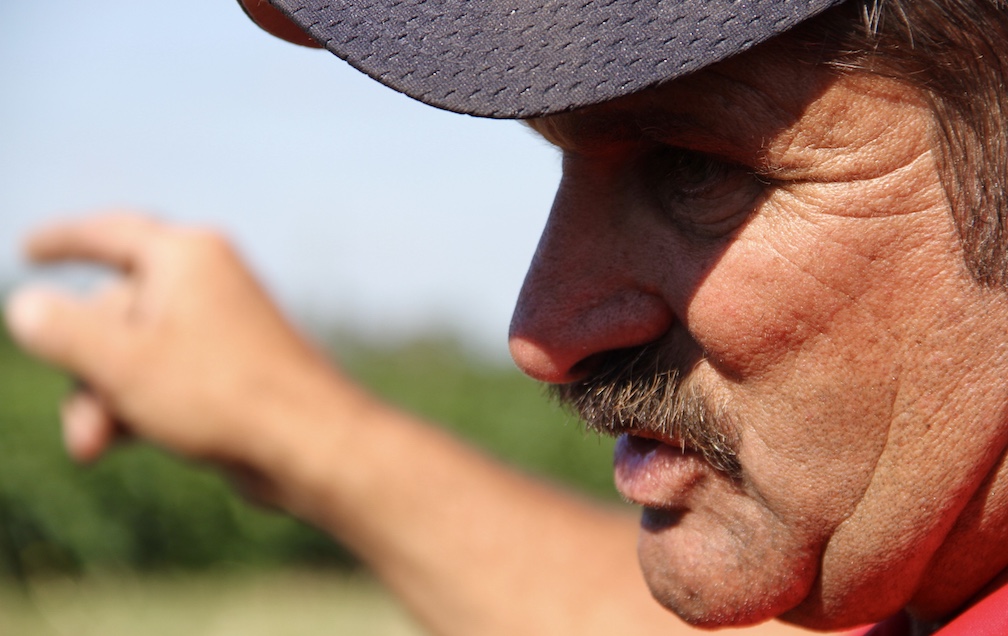
After decades spent building a reputation with single bricks of achievement—farmer by farmer and promise by kept promise—Ferrie is reaping the yield of integrity, esteemed by the farming community at large.
“What have I done right in my farming life? That’s for others to say in the end, but I know I’ve given honest answers to farmers and I’ve never been afraid to admit when I don’t know,” Ferrie concludes. “I’ve always tried to listen, listen, and listen. Yes, anyone who knows me knows I love to talk—but I’ll listen first.”
As he rolls through his 60s, don’t expect retirement. “This is not a job,” Ferrie emphasizes. “This is my genetics. It’s sometimes extremely hard work, but I love it. I get genuine joy from knowing a farmer trusts me. Passion, fun, and satisfaction—all those words apply.”
If the show stops tomorrow, what would Ferrie miss the most? Family and farmers. “What kind of father will my kids testify I was? What do I leave behind as a man of faith in God? What impact did I make in the lives of farmers? Those are the only things that matter to me.”
Candid. Frank. Plain. Spoken by a simple kind of man.
To read more stories from Chris Bennett (cbennett@farmjournal.com 662-592-1106) see:
Young Farmer uses YouTube and Video Games to Buy $1.8M Land
Cottonmouth Farmer: The Insane Tale of a Buck-Wild Scheme to Corner the Snake Venom Market
Tractorcade: How an Epic Convoy and Legendary Farmer Army Shook Washington, D.C.
Bagging the Tomato King: The Insane Hunt for Agriculture’s Wildest Con Man
While America Slept, China Stole the Farm
Bizarre Mystery of Mummified Coon Dog Solved After 40 Years
The Arrowhead whisperer: Stunning Indian Artifact Collection Found on Farmland
Where's the Beef: Con Artist Turns Texas Cattle Industry Into $100M Playground
Fleecing the Farm: How a Fake Crop Fueled a Bizarre $25 Million Ag Scam
Skeleton In the Walls: Mysterious Arkansas Farmhouse Hides Civil War History
US Farming Loses the King of Combines
Ghost in the House: A Forgotten American Farming Tragedy
Rat Hunting with the Dogs of War, Farming's Greatest Show on Legs
Evil Grain: The Wild Tale of History’s Biggest Crop Insurance Scam





